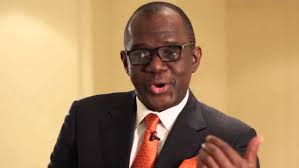The President and Chief Executive Officer of the Regional Maritime Development Bank, Mr. Adeniran Aderogba, has said that Africa’s mining sector is still facing major problems that are stopping it from growing and creating real value. He made this known during a high-level panel at the African Development Bank Annual Meetings held recently in Abidjan, Côte d’Ivoire.
Speaking on the topic, “Mobilising Domestic Capital for Africa’s Mining Sector”, Aderogba said the continent is full of mineral wealth, but many important projects are not moving forward because of structural and financial challenges. He said that until African countries solve these issues, the mining industry will continue to lag behind.
He pointed out four main challenges: shortage of early-stage capital, poor geological data, weak project development activity, and lack of good infrastructure like roads, railways, and power systems. According to him, these problems are not just technical but serious structural issues that have stopped the continent from competing globally.
“Africa’s mineral wealth is not in doubt. But we need to turn that potential into productivity. Right now, we don’t have enough early-stage capital. This discourages people from exploring new sites and limits proper mapping of our resources. That is why many mining projects don’t even get off the ground,” Aderogba said.
He also said that while some African financial institutions are now looking at investing in value-added sectors like processing and manufacturing, they are still avoiding the early stages of mining, which are seen as too risky. Aderogba said local banks usually avoid funding exploration activities because they are not sure they will get their money back and because there are not enough tools to reduce those risks.
He said African governments and central banks need to do more to make the environment better for investment. This includes giving tax breaks, loan guarantees, and other financial support tools to reduce the risks for investors.
To close the funding gap in the mining sector, Aderogba suggested that African countries should look into new financial options like mining bonds, mineral royalty securitisation, and blended finance models. Blended finance combines money from both government and private investors to make projects more attractive.
He also pushed for strong public-private partnerships and said African countries must improve their capacity to prepare mining projects in a professional and bankable way. Aderogba stressed that if Africa wants to control its mining future, it must not depend only on foreign investors.
“We must build strong local financial systems that can support the entire mining value chain—from exploration to processing and production. Ministries of finance should offer tax reliefs, while central banks should put in place monetary policies and guarantee systems that make investment easier,” he said.
He added that Africa is very important to the global energy transition, especially because it has most of the key minerals needed for clean energy technologies. These include two-thirds of the world’s cobalt, 30% of lithium, 20% of graphite, and more than 30% of manganese. These minerals are used in making electric vehicles, batteries, and renewable energy equipment.
Aderogba also mentioned some countries leading in mineral resources. He said Guinea has large reserves of bauxite, Gabon is a top manganese producer, and the Democratic Republic of Congo supplies over 70% of the world’s cobalt. He said these countries and others can benefit more if Africa moves from just exporting raw minerals to also processing them within the continent.
“Extracting minerals is not enough. We must process them here. That is how we create jobs, industries, and stronger economies. If we do that, we can trade goods like batteries, machinery, and vehicle parts across Africa and boost intra-African trade. With the right infrastructure and maritime support, we can build a mining industry that benefits Africans first,” he said.
Aderogba ended by calling on leaders across the continent to stop repeating the old pattern of raw export and take bold steps towards industrialisation, value addition, and regional cooperation.
